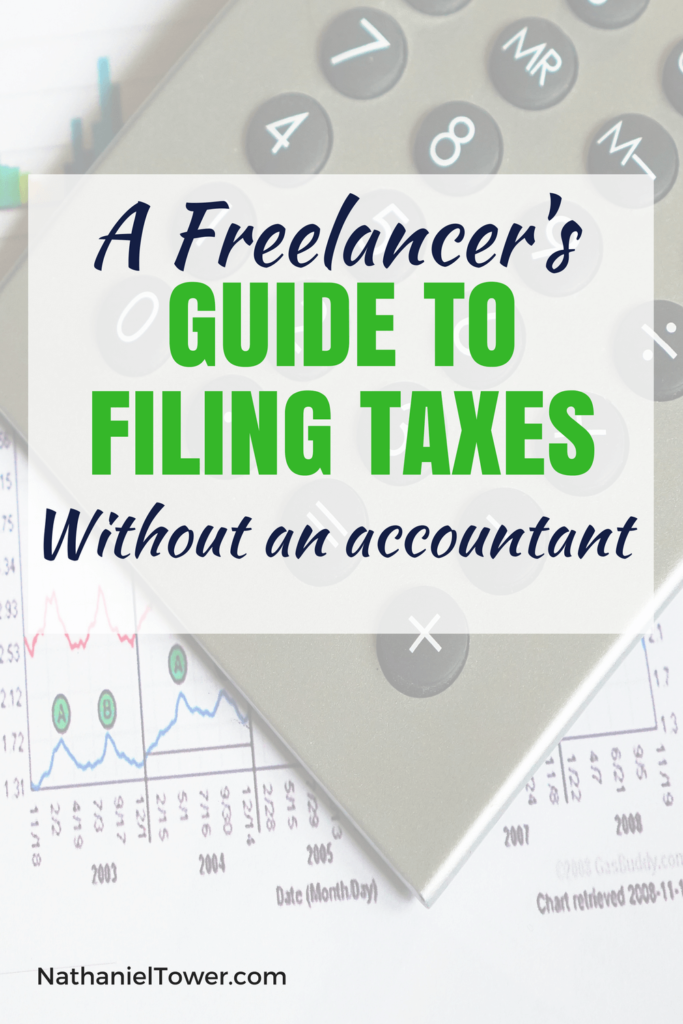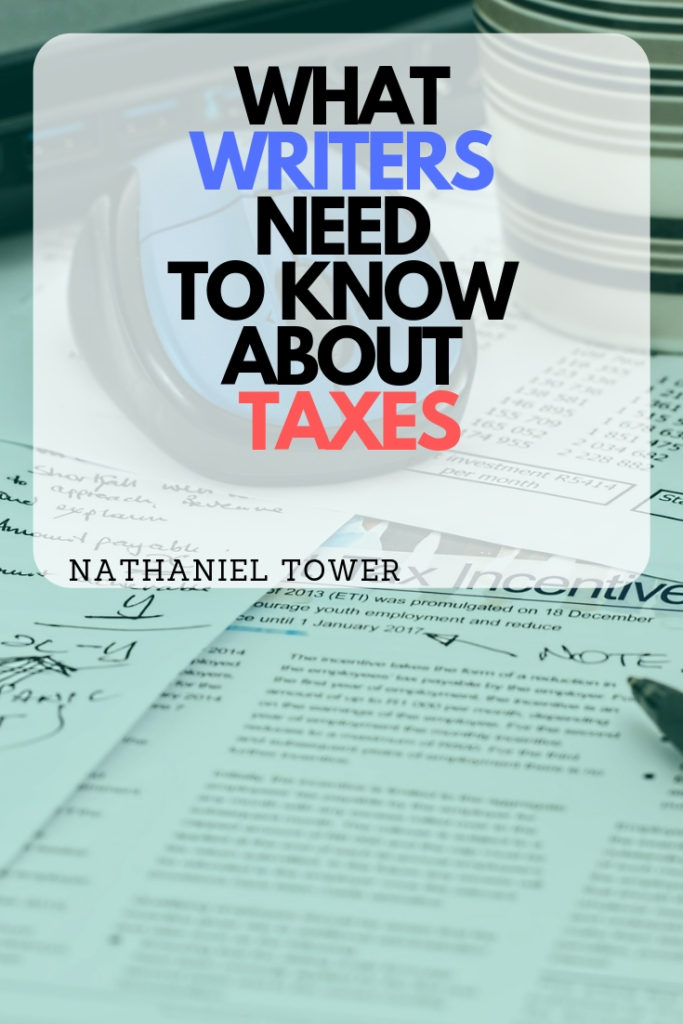Last Updated on September 4, 2021 by Nathaniel Tower

Getting paid for your writing feels great. Paying taxes on those earnings does not.
There are plenty of ways to make money as a writer. Whether you received an advance, earned royalties, won a writing contest, or got paid for individual stories, poems, or articles, you are supposed to give Uncle Sam a cut of your earnings (yes, all of those earnings). But I’m not here to get moralistic or convince you to follow the law. Rather, I want to make it simple for people who are going to report this money.
Paying taxes on your writing really isn’t that difficult. With all the free online tax software that’s available, it’s actually quite simple to do it yourself. And much more affordable. The average tax preparation cost is almost $300. If you are reporting freelance income, you can expect to pay even more (which might leave you losing money as a writer).
To pay your writing taxes, you really just need to know how much you made as a writer (income)—and how much you spent (expenses). But before we get too far into this, there’s one other thing you should probably know. Since the U.S. operates on a “pay-as-you-go” system for taxes, you’re technically supposed to pay quarterly if you make freelance income. If you only file during the standard tax season every year, you might end up owing a penalty.
Avoiding a Tax Penalty as a Writer
Whether or not you will owe a penalty depends on how much you make as a writer—and how much you are taxed on other things. If freelance writing is your main form of income, you will definitely need to pay quarterly. However, if freelance writing supplements another job, you can skip the quarterly payments by increasing the withholdings from your normal paycheck.
If you only pay once a year, you’ll typically end up with a tax penalty (which means you’ll have to pay even more taxes) if:
- You owe more than a thousand dollars
- You owe more than 10% of your total tax
- You owe more than 10% of what you paid in taxes during the previous year
The form to calculate a tax penalty is one of the most complicated forms the IRS offers. I highly recommend you don’t go this route. The best way to avoid it—pay your taxes as you go.
Reporting Your Freelance Writing Income
Okay, now that we have that all cleared up, let’s talk about how to file your taxes if you do have freelance income. When reporting your writing income, you’ll need to complete a Schedule C (business income) and a Schedule SE (self-employment tax) in addition to your standard 1040 form.
As far as the IRS is concerned, if you make money as a freelance writer, then you have your own business. Luckily, these forms aren’t very complicated. If your expenses as a writer are less than $5,000, you can use the incredibly simple Schedule C-EZ, which shouldn’t take you more than about 5 minutes to complete.
When filing your Schedule C or Schedule C-EZ, you’ll need to complete some information about your business. Here’s how to do it if you are a freelance writer:
On Line A, put “Freelance Writer” as your principal business or profession. Really, it doesn’t really matter what you put here as long as it’s related to what you do, so you can get cute if you want to. “Blogger” or “novelist” or “writing machine” could all work equally well, but I prefer to keep it straightforward.
Line B requires you to enter a business code. I’ll save you the trouble of sifting through all the different IRS codes. The business code for freelance writing is 711510. It’s the same code if you are a novelist, a poet, a blogger, or even one of those viral list writers.
You’ll most likely skip lines C, D, and E, unless you writer under a pen name or rent an office to do your writing.
Now it’s time to report all that writing dough. If you self-publish through Amazon, Lulu, or another major service, you probably received a 1099-MISC, which reports your royalties and any taxes that were taken out. Unlike W-2s, you don’t actually have to send these forms in with your taxes, but you do have to report them. Aside from any income reported on a 1099 form, you’ll have to rely on your own personal records to calculate your income (gross receipts). This is pretty simple. Just add up everything you made as a writer and put it on Line 1.
Writing Off Your Freelance Expenses
Next, you need to calculate your expenses. This is very simple if you’re reporting less than $5,000 in expenses. If you are reporting more, you’ll need to fill out the slightly more cumbersome Schedule C. Luckily, no matter which form you are using, the instructions are pretty clear.
The bigger question is what exactly you can report as an expense as a freelance writer. The short answer is this: anything that came out of your pocket that went directly to your job as a writer. One very important distinction to make here: don’t confuse being a freelance writer with the hobby of writing. If you sit around writing poems for fun and happen to make a few bucks on one, you really aren’t a freelance writer. In this case, you may be able to skip the Schedule C nonsense and just report this as additional income on your 1040. How do you know if you are a freelance writer or just a hobbyist? Well, you’ll probably know based on how much you make and what your habits are.
If you are a freelance writer, what can you report as an expense? Many things qualify. Your subscription to Duotrope. The costs to maintain your website. The cost of printing and postage to send out those manuscripts. Your advertising costs. Your costs to travel to readings all over the country. The list goes on.
Things I don’t recommend reporting as expenses: lunch at the coffee shop while you pound out your next masterpiece on your novelty typewriter. Your monthly internet bill (come on, you don’t pay for internet because you are a writer; you pay for internet because you are a human in the 21st century). The gas you consumed while driving back and forth from the park bench that inspires you.
Once you’ve added up all your expenses, record them on Line 2 (again, if it’s over $5,000, you need to complete the full-blown version of the form). Now subtract your expenses from your income and you’ll have your profit. This is your taxable amount. Congratulations on being a professional writer!
Writers Pay Self-Employment Tax
Before you slap this number down as your business income on your 1040 and file your taxes, you also need to calculate your Self-Employment tax. If your net profit for your freelance writing is over $400, you’ll owe additional tax and you’ll need to complete the Schedule SE. Again, this is not a super complicated form. It’s basically just a calculator. You might be wondering why you are taxed more on your freelance income. There are two reasons: 1. You have to make up for the fact that you didn’t pay Social Security and Medicare taxes, and 2. You have to make up for the fact that your employer didn’t pay part of these taxes as well. In other words, your freelance income is taxed at a slightly higher rate than income you get that’s reported on a W-2 form.
After you’ve completed your Schedule C and your Schedule SE, you’re ready to finish your 1040. I don’t need to tell you how to transfer the numbers over. Just follow the directions. But I will tell you not to forget to report the deductible portion of your self-employment tax under your adjusted gross income (this will save you a couple bucks). As a general rule, you can deduct half of your self-employment tax. You take this deduction on Form 1040, and it reduces your overall tax responsibility for the year.
There. Now you should have enough information to do your taxes as a writer. Got questions? Leave a comment and I’ll address it (I’ve been doing this for a few years now and have it down pat). Or, better yet, ask a qualified tax professional. But don’t call the IRS. They aren’t really helping anyone this year.
Congratulations on being a real writer! You know you’ve made it when you start paying taxes on your writing.
Note: This post has been prepared for informational purposes only. Please consult a qualified tax professional to determine the best approach to filing your taxes based on your own personal circumstances.




This is helpful but a more detailed approach might be more informative. Part 2 of the form is not covered. Have a great day!
Technically, you can write off your internet bill, or at least a portion of it. If you are using the internet for business (submissions, blogging), it’s considered a business expense. Think of it this way: if you rented a small office to do your writing, you would be paying for internet at that location and utilities in connection with a home office are expenses. So, a home internet bill can be written off, but you should only take a reasonable percentage of it.
Also, if you have an actual room that is used for business and only business (no kids toys or craft area), you can write that off at $5 per square foot. There’s an alternative calculation which it takes into account a portion of your home expenses but that can bite you in the ass when you sell your home. I’d stick to the $5 per square foot if only because it’s easier both short-term and long-term.
Same goes for equipment like a computer or a printer. If it’s in your office and you only use it for your business, it’s definitely a write-off.
Certain research related expenses can be used as well. I wouldn’t go taking an expensive spa weekend and trying to write that off just because one of my characters peed in a mud bath, but I do use PACER as a legitimate expense for one of my blogs.
How do I know this stuff? I worked at a bookkeeping firm for fifteen years. We handled a lot of small businesses as well as the general public.
Thanks for adding so much to the discussion. Sounds like you should write your own post on the topic! You make a lot of good points here. Most of these are things I’ve been afraid to write off (internet expenses, room usage). I use the internet for a lot of things other than business, so I’m hesitant to write it off or even try to figure out the percentage I use for business. And we don’t have enough space in our house to dedicate a room entirely to business. Now I think I’ll go take an expensive spa weekend for business purposes…
I have a question! My partner and I cowrote a book that is headed through Amazon to be published. Amazon is asking for my tax info for filing purposes. After some research I discovered we technically don’t classify as a partnership? So one person would have to claim all the taxes themselves and each month pay a royalty amount to the second author and furthermore claim that money as expenses on your taxes at the end of the year.
Do you still have to pay quarterly if done this way? Is there a better way? What are your general thoughts. We are trying to get this figured out to publish the book but are struggling with what exactly to do re taxes. We definitely want to follow all rules and precautions.
Hi Laura. Thank you for reading and commenting. Congratulations on the book! This sounds like a somewhat complex tax question that I don’t feel comfortable answering without a lot more information (and even then I’m not sure I would trust my answer completely). I would recommend you consult with a tax professional.
Good luck with the book. I hope it sells Well!
You wrote:
“But I will tell you not to forget to report the deductible portion of your self-employment tax under your adjusted gross income (this will save you a couple bucks).”
What is the deductible part? You didn’t say what it is or how to report it.
Hi Alan,
You can deduct up to 50% of your self-employment tax. You take the deduction on the 1040 form as an adjustment to your income, and this reduces your Adjusted Gross Income as well as your overall tax responsibility.
As a hypothetical example, if your self-employment tax is $2,000, you can deduct $1,000 from your income on Form 1040.
Hope that helps!
This is all pretty awesome info. I ran across this in 2023 and tried to download a Schedule C-EZ. It appears the “EZ” is no long used and that we are required to stick with Schedule C only. Maybe I’m wrong but throwing it out there in case anyone else is following along.